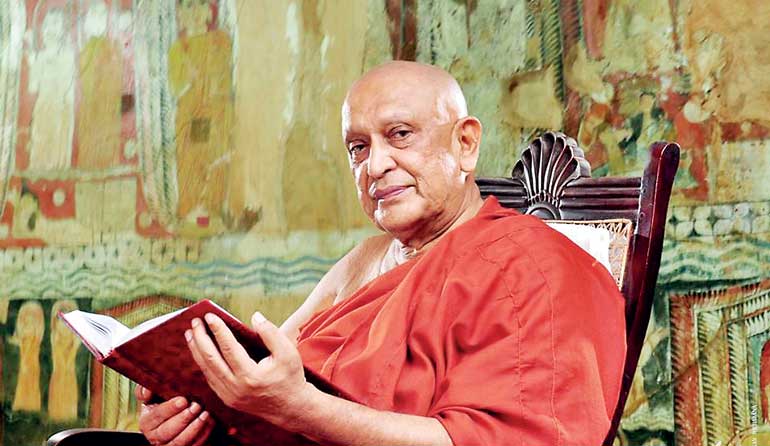Friday Feb 20, 2026
Friday Feb 20, 2026
Wednesday, 18 November 2015 00:00 - - {{hitsCtrl.values.hits}}

I first met Ven. Maduluwawe Sobitha Thero almost a decade ago, through my father-in-law Padmawarna Wijayatilake. The first impression marked me. There was an aura about Sobitha Hamuduruwo. That’s why when a friend, Martin Pieris, wanted to write a book about prominent Sri Lankan personalities, I said that Sobitha Hamuduruwo not only has to be in it but deserves to be featured on the cover.
In all my encounters thereafter the impression I had of Sobitha Hamuduruwo as a visionary and a fearless leader who could mobilise people to a just cause was reaffirmed time and again. He had a good understanding of the state of things in the country. He had a vision of what this country could be and he had a road map that would take the country there. Most of all he had the patience and will so necessary to make it all a reality.
Sobitha Hamuduruwo always championed causes that he considered were just. He never worried about consequences which were often harsh and included injuries to his person. Despite this, he seldom focused on the identity of the person or party that caused him injury, choosing instead to concentrate on systems and processes that produced such outcomes. Through it all, he never lost sight of the objectives that prompted him to choose a particular course of action.
He was not alone in sensing the destructive and undemocratic path taken by Mahinda Rajapaksa, but to his credit even as he took on the man, he understood intimately that the individual was the product of a serious systemic flaw. This does not mean that he didn’t criticise the individual. When General Sarath Fonseka was arrested, he was quick to point out what others knew but were scared to articulate: ‘The defeat of the LTTE was being converted into a victory of a family’.
He recognised that Mahinda Rajapaksa needed to be defeated but more importantly saw that such an eventuality was but a single and insufficient step in what had to be a longer journey towards establishing constitutional safeguards against dictatorial rule. This is why he worked hard for almost five years to build a common programmatic platform through the efforts of civil society rather than political actors to defeat Mahinda Rajapaksa. This is how the National Movement for Social Justice came into being.
Sobitha Hamuduruwo held extensive discussions, initially with Karu Jayasuriya, Dr. Ranjith Cabraal, Jayampathi Wickramaratne, Nirmal Ranjith Devasiri and J.C. Weliamuna and later with a large number of other individuals and organisations. They concluded that the one idea that could unite diverse political forces was abolishing the executive presidency. He participated in over 200 meetings around the country to mobilise people to this idea. He did this amid many challenges, but eventually all major parties and civil society organisations rallied to support him.
The first step was to push all parties and political leaders to agree on a common candidate. By the middle of 2014, there were many who wanted Sobitha Hamuduruwo to come forward as the common candidate against Mahinda Rajapaksa, but he encouraged Ranil Wickremesinghe and Chandrika Kumaratunga to find someone else since he felt it was wrong for a member of the clergy to be the constitutional head of a democracy. He was particularly disappointed that sections of the State-run media relentlessly attacked him of having personal political ambitions but he did not allow this disillusionment to distract him from the broader political project. Indeed, throughout the process, Sobitha Hamuduruwo focused more on the objective of institutional reform rather than a change of personalities.
That was how he saw things, always. It was all about the country. He knew the LTTE had to be defeated but was always distressed by the fact that citizens of the country were killing one another. He was a nationalist for all citizens and their rights, regardless of their ethnic identity or religious faith. Even in the run up to the presidential election, his focus was on an idea and a winning concept. It was this concept that the people rallied around, the concept of abolishing the Executive Presidency and establishing Good Governance.
That concept was essentially prefaced by the conviction that systems must be changed so that replacements won’t be worse than the replaced, as he argued had always been the case. He made it clear that replacing Mahinda Rajapaksa was less important than changing the system that produced dictatorships.
Sobitha Hamuduruwo was convinced that the position, given constitutional provisions, made incumbents feel they are above the law. He knew through experience that few if any would tell such individuals the truth because the position and the power embedded in it was so intimidating. After a while, he argued, regardless of rhetoric about being custodians and not owners, rulers behave as if they own the country.
His efforts made the entire world think about Sri Lanka, much in the same way that the country came into prominence due to the non-aligned efforts of Sirimavo Bandaranaike who was also the world’s first female Prime Minister, the World Cup victory in 1996, the tragedy of the tsunami in 2004 and the defeat of the LTTE in 2009.
This time it was about a country coming together to overthrow a dictatorship, but creditably without bloodshed and most importantly about a programme that sought to create safeguards against dictatorial tendencies. Sobitha Thero made it happen. He championed an idea and creat ed a winning concept. He led a movement that would ensure victory, regardless of who the candidate was. He kept politicians at a distance and for good reason. He knew they were mostly inclined to promise to build bridges even if there was no river. The exception perhaps was Karu Jayasuriya and even he was considered more a trusted friend rather than a creature of politics. This movement was not politician-led. It was a civil movement that sought not to bring a politician to power but to ensure system change.
ed a winning concept. He led a movement that would ensure victory, regardless of who the candidate was. He kept politicians at a distance and for good reason. He knew they were mostly inclined to promise to build bridges even if there was no river. The exception perhaps was Karu Jayasuriya and even he was considered more a trusted friend rather than a creature of politics. This movement was not politician-led. It was a civil movement that sought not to bring a politician to power but to ensure system change.
Sobitha Hamuduruwo had expectations for the country. He was frustrated about recent developments, especially the slowness of the reform project. This frustration was and is shared by many. This is why that there was reiteration of the commitment to good governance and the abolishing of the executive presidency from all quarters upon his death. In other words, even in his passing and may we say especially in his passing Sobitha Hamuduruwo has succeeded in re-conscientising the entire citizenry, reminding everyone that the journey is long, that winning a battle makes sense only if the war is also won.
Ven. Maduluwawe Sobitha Thero is no more. While everyone wishes him the supreme bliss of Nibbana, in this lifetime, in this country, those who looked up to him as a visionary leader, if they are honest in their sorrow and truly wish to commemorate Sobitha Hamuduruwo, have to rededicate themselves to the cause that he championed. He envisioned a land where no one is above the law, a land where citizenship has meaning, a land without political patronage or nepotism, a land where robust systems with the right constitutional safeguards ensure that there can be no wrongdoing. Such a land will be delivered only if the citizens take the initiative and do not leave it in the hands of politicians who may, as they often have, waver when personal agendas come into play.
We have to ask ourselves if we find ourselves living in such a land and if the answer is ‘no’ then we have to relentlessly work towards securing for ourselves such a land that Sobitha Hamuduruwo envisioned for all of us. In short it is incumbent on all those who identified with Sobitha Hamuduruwo’s project to visit their conscience again and again, and to test word and deed against the concepts he championed, for he set up for all of us a framework for proper and principled political conduct. That alone would be tribute to this visionary Sri Lankan, this exceptional Buddha-Putra whose guidance and leadership we are all privileged to have benefitted from.
Sobitha Hamuduruwo must chair, so to speak, every discussion on good governance and sorely needed political reform. He cannot be forgotten and those who do would never be forgiven by the people of this country.